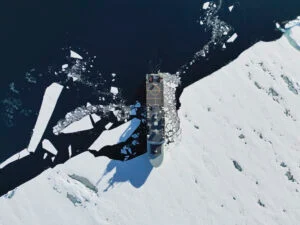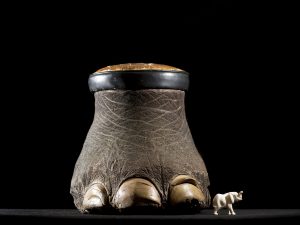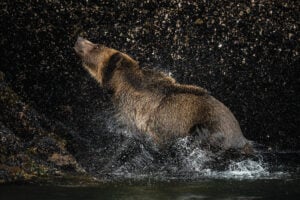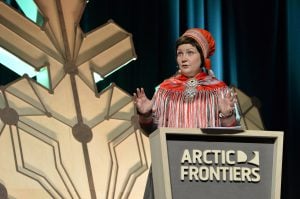
People & Culture
On thin ice: Who “owns” the Arctic?
As the climate heats up, so do talks over land ownership in the Arctic. What does Canadian Arctic Sovereignty look like as the ice melts?
- 4353 words
- 18 minutes
Travel
A uniquely Canadian bucket list adventure featuring wildlife encounters, cultural history and custom-built experiences

Isolation is immaculate 800 kilometres north of the Arctic Circle. The low midnight sun beams over a row of striking expedition tents located on the empty shores of the Cunningham Inlet while hundreds of migrating beluga whales pop and play in their warm-water nursery nearby. Admiring this scene, it felt like I’d been magically transplanted into a David Attenborough-narrated nature documentary, aided by the fact that BBC filmmakers were further down the inlet, capturing the whales for, yes, a David Attenborough-narrated nature documentary. Arctic Watch, the world’s most northerly eco-lodge, puts on quite a show.

The son of a famed mountaineer who claimed the first ascents throughout the Arctic, Richard Weber, is one of the most travelled polar explorers on the planet. He was the first man to trek to the North Pole six times, including unsupported treks that have never been equalled. His wife Josee has also led numerous expeditions, and their sons Tessum and Nansen continue the family legacy with their own polar achievements, including Tessum’s speed record to the North Pole and Nansen’s renowned wildlife photography. In 2000, the Weber family purchased a defunct whale-watching operation on Nunavut’s Somerset Island, recognizing its unique location to encounter the belugas, as well as muskox, polar bears, wolves, narwhal, Arctic fox, hare, and other wildlife on a treeless island about the size of Belgium. In addition to the belugas, guests fly in to hike, fish, ATV, snorkel, kayak, paddle board, picnic, mountain bike, and discover ancient human settlements in this vast northern wilderness. Arctic Watch offers the comfort of hot showers, flush toilets, thick duvets, gourmet food, knowledgeable guides, and unlimited Arctic adventure.
“BBC’s Frozen Planet really put us on the map,” Tessum Weber tells me from his family’s permanent home in Vernon, B.C. “It put the Arctic’s open spaces front and centre. Suddenly people were curious about the top of the world.” Initially, clients arrived for the annual beluga migration featured in the show, but that quickly evolved to encompass more wildlife encounters, cultural history, and unique, custom-built experiences. The Webers have guided guests to evidence of 4,000-year-old human settlements and ancient whale bones poking out of the permafrost. One guest snorkelled with a narwhal, a group biked along channels in the ice floe, and another visited a 43-million-year-old mummified forest. Who doesn’t crave small group adventure, safety and comfort in the last great wilderness on Earth?

“Antarctica has become quite busy,” says Tessum, acknowledging that tourists now visit the seventh continent by the cruise load. Welcoming just 26 guests a week throughout July and August, Arctic Watch only hosts about 100 guests a year. I’ve been fortunate to be one of them.
The light, stillness and stark landscape can be mesmerizing. Picking Arctic cotton on a day hike into the hills, I’m struck by a pure sense of freedom and grateful for the lack of biting insects. Summer is short up north. On previous visits to the Arctic, I’ve found relentless mosquitoes terrifying (the Canadian euphemism is fierce). However, 74 degrees North is above the bug line, where outdoor opportunities open up 24 hours a day. We’re guided to a striking canyon with a series of waterfalls, where I take an invigorating shower beneath a 15-metre-tall cascade. Swimming in the high Arctic is possible because it’s much warmer up here than it used to be.
“There’s been a massive change. The ice is no longer as thick,” explains Tessum. “We’re seeing different wildlife migration patterns and record temperatures. Last year it was above 20 degrees Celsius for 10 days on the Northwest Passage. We’re seeing whale bones emerging from the permafrost after being buried for 7,000 years. The Arctic is warming faster than anywhere else on the planet.”


Fine dining in such a remote environment is both deeply appreciated and a little jarring. Josee oversees delicious daily feasts with freshly-caught Arctic char, tenderloin, roast lamb, excellent wine and homemade bread. Everything in the Arctic is expensive, and while most guests are affluent, others have saved up for years and run a gamut of backgrounds. There are birders and hikers, photographers, teachers, families, and scientists too. The Webers also run a federally registered foundation to support ongoing research in the Arctic. The lodge currently hosts a scientist tracking a devastating pathogen that is killing muskoxen. A potential vaccine could stave off the extinction of the entire species.
After dinner, Richard Weber gives a presentation about his wild polar exploits. Nansen discusses his jaw-dropping drone footage and photography. Passion for the north runs through everything, and wildlife is treated with the utmost respect.

“We try to accommodate requests, but we’re not going to push it,” says Tessum. A guest that snorkelled with a narwhal was rewarded for her patience. The whales decided to approach her and engage with a curious, harmless being in the water. They were sad to see her return to shore. We have no idea what’s going to happen, so we try to keep expectations in check.”
Arctic Watch is a steward for both the region and unpopulated Somerset Island. Geo-politically, a warming Arctic opens the possibilities of new shipping routes and resource extraction. Tessum explains how a Swedish icebreaker arrived unannounced at the inlet and caused havoc with the frolicking beluga whales. The lodge called in the Department of Environment and were able to chase them off. “We had to do some policing,” says Tessum. Hopefully, that remains an isolated incident.
Last summer, a Netflix wildlife film crew stayed at the lodge for seven weeks. There’s no word yet if David Attenborough is narrating this new series. Several years ago, my imagination conjured the great man’s distinctive voice throughout my week-long adventures on the tundra.
“Observe bright-coloured streams mineralized with rock flour, the shaggy muskoxen, the ancient firepits and heavy skeletons of bowhead whales,” says the Attenborough in my head. “One is indeed fortunate to visit the world’s most northerly eco-lodge, to experience such a uniquely Canadian, and undeniably bucket list, Arctic adventure.”
Travel with us
High Arctic Explorer
Journey to the Canadian Arctic with RCGS Ambassador Joseph Frey where you will marvel at towering icebergs, cruise pristine natural areas to spot amazing Arctic wildlife, enjoy the warmth of an Inuit welcome, and explore the spectacular west coast of Greenland.
Are you passionate about Canadian geography?
You can support Canadian Geographic in 3 ways:

People & Culture
As the climate heats up, so do talks over land ownership in the Arctic. What does Canadian Arctic Sovereignty look like as the ice melts?

Wildlife
An estimated annual $175-billion business, the illegal trade in wildlife is the world’s fourth-largest criminal enterprise. It stands to radically alter the animal kingdom.

Wildlife
Salmon runs are failing and grizzlies seem to be on the move in the islands between mainland B.C. and northern Vancouver Island. What’s going on in the Broughton Archipelago?

Environment
The uncertainty and change that's currently disrupting the region dominated the annual meeting's agenda